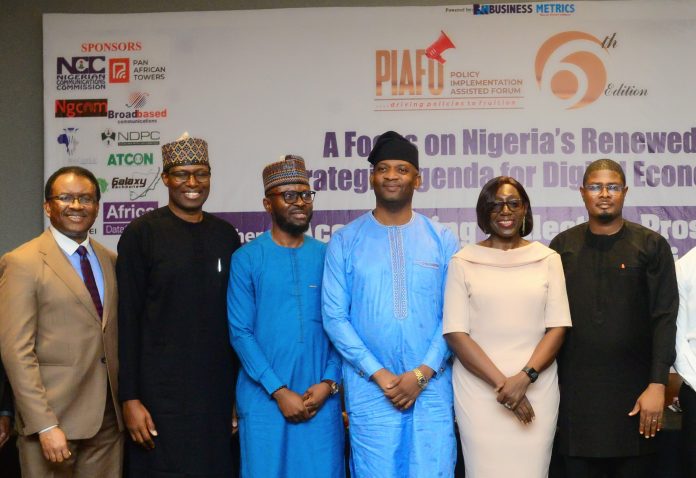Stakeholders in the telecommunications industry have said the Federal Government’s plan to deploy 90,000 kilometers of fibre optic cables across the country will face several obstacles, especially from state governments, that might truncate the project.
According to them, without addressing the current issue of Right of Way charges, multiple taxation, and levies, which are under the control of state governments, the project which is to be implemented through a Special Purpose Vehicle (SPV) would be an exercise in futility.
The stakeholders, who spoke during the Sixth Edition of the Policy Implementation Assisted Forum (PIAFO) in Lagos on Wednesday, which was a focus on Nigeria’s renewed strategic agenda for digital economy.
They stressed the need to ensure the successful implementation of the project which was announced recently by the Federal Government to complement existing connectivity for universal access to the internet across Nigeria and provide the Nigerian digital economy with the backbone infrastructure it needed.
Addressing the obstacles
Presenting a paper on the topic, ‘Harmonizing Nigeria’s Fibre Deployment Strategies for Effective Implementation’, Executive Director of Broadbased Communications, Mr. Chidi Ibisi, said while the government’s SPV initiative is a good plan that could help the country bridge its current digital infrastructure gap, the government would need to address current challenges.
“The issues of high cost of Right of Way (RoW), destruction of fiber by road construction companies and vandals all need to be addressed for this new SPV initiative to be successful,” he said.
Highlighting some of the challenges telecom operators face when deploying infrastructure, the Group Chief Operating Officer of WTES Projects Limited, Mr. Chidi Ajuzie, said the biggest challenge to fibre cable laying in Nigeria is the informal RoW by hoodlums in states.
“For states, a formal right of way is set and some states are adopting it but the informal side of the right of way is where the complexity has come today.
“If I’m trying to lay fibre in some communities here in Lagos, the first thing that happens is the so-called land owners (omo onile) come out and a different set of people will keep coming from one street to another and they charge you. How do we achieve adequate broadband infrastructure in this kind of situation?” he said.
Role of state governments
According to the Chairman of the Association of Licensed Telecommunications Operators of Nigeria (ALTON) Engr. Gbenga Adebayo, for the 90,000 kilometres fibre project to succeed, the state governments have to take ownership.
“For the project to succeed, I think the governments at sub-nationals should take ownership. This issue of state governments seeing right of way as IGR should be a thing of the past. We can’t talk about the digital economy on one side and the government is seeing those who provide the services as sources of revenue.
“The government has always come up with good policies, but the implantation, particularly when they are tested far afield, is the biggest problem. Governors will go to Abuja and say ‘in my state, I will give the right of way free of charge.’
“When you go to such a state, they may give you the right of way for zero or one Naira, but they will give you developmental levy, education levy, state impact levy, ecosystem levy. When you add all of these together, it is more than the right of way charges. So, who is playing who?” he said.
Making vital contributions at the forum, Dr. Ayotunde Coker, the Chief Executive Officer of Open Access Data Centre (OADC) stressed the need for the fibre project to be executed by the private sector even as the World Bank is expected to fund it with up to $3 billion.
He said: “the World Bank can put money into the government but it needs private sector partnerships as the execution engine and that’s what we’ve been pushing in Africa.
“The key thing is that when the World Bank puts the money in, it should engage the private sector, figure out the policies that it needs to do and enable the private sector to execute them effectively and make it as open as possible. With that, they can achieve what they are trying to achieve.”
He further stressed that for the success of the project, Nigeria should learn lessons of what didn’t work in the past, to achieve the new broadband penetration targets with the fibre range that is required.
“Meaningful broadband is what we need, rather than just a huge set of megabits per second implementation. We need superhighway fibres. We need the distribution of these backbone that allows us then to fan out.”
He further urged state governors to be part of the project by providing an enabling environment for infrastructure roll-out, adding: “if you are a state governor and didn’t participate in it, the state won’t grow and it’s going to impact your state.”
Earlier in his opening address, the convener of PIAFo, Mr. Omobayo Azeez, said the conference was to create a midpoint dialogue platform for digital economy stakeholders across both the public and private divides to brainstorm, exchange perspectives, clear grey areas, harmonize thoughts and create a sense of collective responsibility towards accelerating our collective prosperity through technical efficiency.
The event focused on Nigeria’s renewed strategic agenda for digital economy. According to him, the new digital economy blueprint of the federal government does not only sustain existing policy directions and targets, “it also challenges us on the possibilities of attaining new frontiers with a view to “Accelerating Our Collective Prosperity through Technical Efficiency” which is the theme of the summit.




